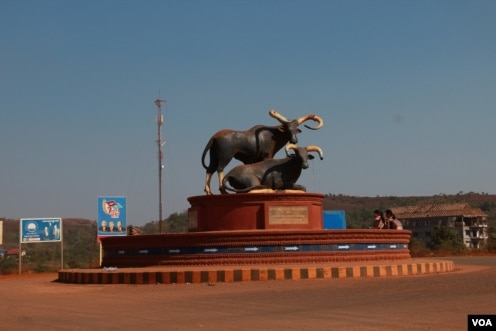 |
| Kouprey is a symbolic statue of Mondulkiri province located in the Sen Monorom provincial capital. (Nov Povleakhena/VOA Khmer) |
 |
| A road leading to an ethnic village in Mondulkiri province, Cambodia. (Nov Povleakhena/VOA Khmer) |
School of Vice: What tragedy ... hardly any trees left standing, let alone Kouprey!
---
Phorn Bopha, VOA Khmer
30 March 2015
MONDULKIRI PROVINCE—
At the Coffee Resort in Sen Monorom, the capital of Mondulkiri province, business is booming.
In just an hour, about 50 tourists, local and foreign alike, come through, ordering coffee or avocado shakes to go. Coffee beans and avocados grow well here, and now, thanks to a better road, so does tourism.
The remote province, in northeastern Cambodia, is known these days as a good place to trek, where wildlife and waterfalls make for good scenery, amid forested mountains of red clay, and where indigenous hill tribes still live a traditional way of life. But it is unclear what the future holds, as development increases.
“There are a mix of tourists,” says Bou Sopheap, the owner of the Coffee Resort. “They are Khmer, European and Asian. They come to visit Mondulkiri because they want to see the forest and the livelihoods of the minority people. And to get fresh air.”
Since opening the resort a few years ago, Bou Sopheap has seen more and more people start coming here, enjoying his coffee and touring his farm, which has more than 30 different kinds of plants. “Hundreds of cars come in every day,” he said.
Kong Sophearak, director of the Ministry of Tourism’s statistic department, says the number of tourists in Mondulkiri has increased thanks to an improved road there. Nearly 11,000 people visited the province in 2014, more than half of them foreigners.
Svay Sam Eang, deputy governor for the province, said Road 76 has 48 good kilometers, and it’s only 60 percent finished. Soon, it will link to Ratanakkiri province, farther north. The province has about 600 rooms now, he said, up from just 100 in 2005. “Sometimes, there’s not enough places for tourists to stay,” he said.
Ho Vandy, co-chair of the Government-Private Sector Working Group on Tourism, recently visited Mondulkiri. He says with the increase in tourism, more signs to help people get around will be needed. “We would like the authorities to put these signs up,” he said.
But all this ecotourism comes at a cost, critics warn. The lifestyles of the indigenous groups here have changed, and the loss of forest and wild animals to development could damage the burgeoning tourism boom.
“Mondulkiri is a province packed with mountains and natural resources—waterfalls, all kinds of wild animals, and exceptionally cool weather,” Chhith Sam Ath, country director for the World Wildlife Fund, which helps develop ecotourism here, said. “So protecting the forest and the ecosystems in the area is significant for attracting tourists.”
The government hopes to bring wild tigers back, to help attract more tourism, he said. That would make Cambodia one of the few places in the world where that can be done, he added.
Svay Sam Eang, the deputy governor, said provincial officials are working with private companies and NGOs to protect more forested areas. “We are protecting the preserved areas, and we won’t allow land grabbing to happen,” he said. “We know that if there are no forests or animals, we can’t entice tourists to come.”
On a recent day, So Phal, a guide from Battambang province, was showing two Belgian clients around Mondulkiri. They sat at the Coffee Resort, just after an elephant ride and tour. They’d toured waterfalls and mountainous areas.
“They’ve wanted to come here for a long time,” So Phal said. “They’ve come now because there are good roads, as well as hotels for them to stay in.” Many kinds of tourists will now come, he said, from backpackers to luxury travelers. “I think Mondulkiri attracts a lot of tourists from the West,” he said. “In the future, it could attract more, if there are more hotels and restaurants for them.”
So Phal says he worries that a loss of natural habitat in the province would dissuade tourism. “They have this idea that it is full of nature, but once they arrive here, they are a bit dismayed, because there aren’t that many animals,” he said. “If we can keep the traditions of the indigenous—to live and dress in the indigenous way—[tourists] would like the place even more,” he said. “But the authentic is disappearing.”

No comments:
Post a Comment